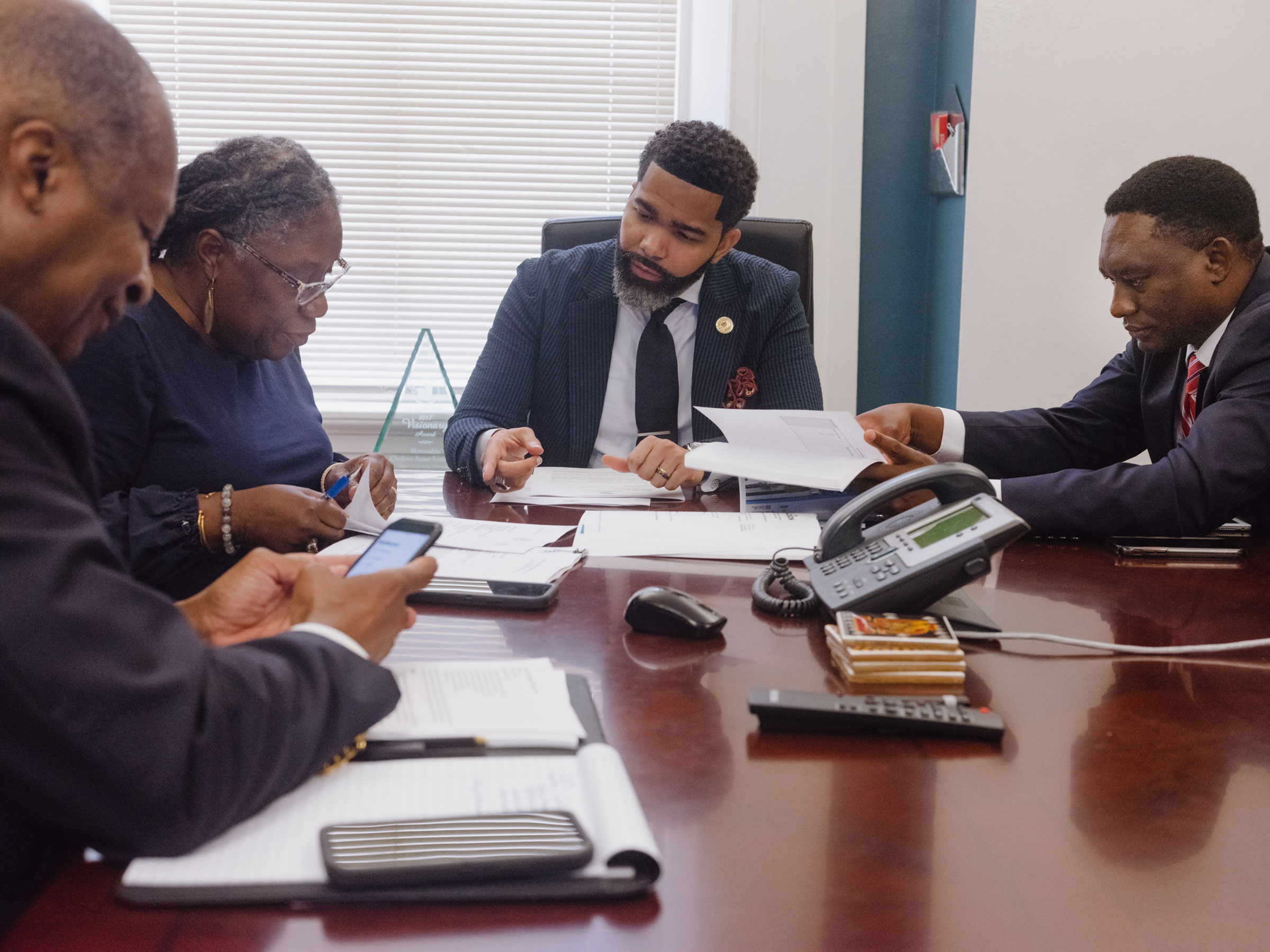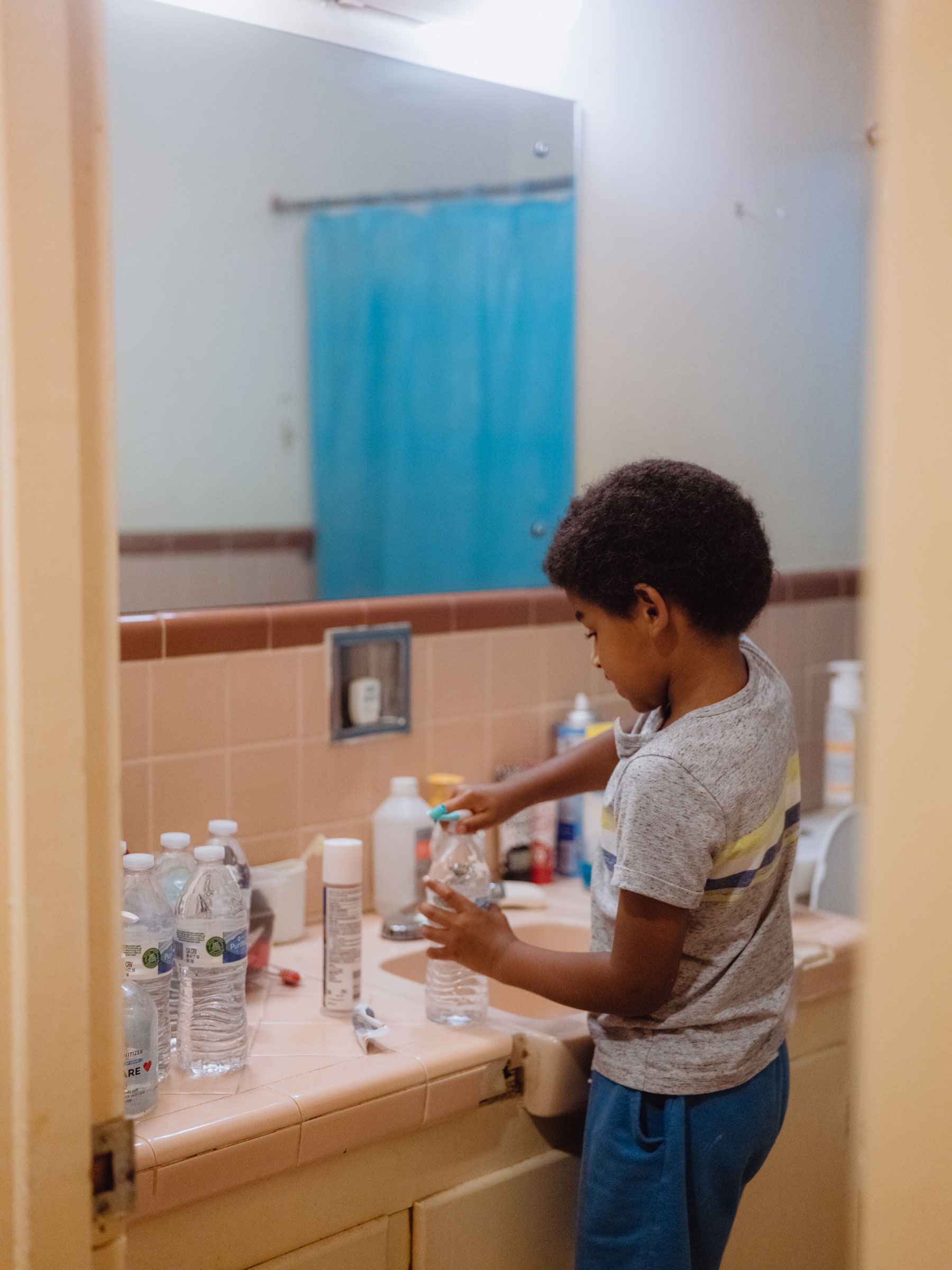
About a week after the catastrophic collapse of his city’s water system, Jackson Mayor Chokwe Antar Lumumba gathers his advisers in a second-floor conference room at city hall. The state’s Republican Governor, Tate Reeves, had given a press conference the day before to announce that running water had been restored, though the city still remained under a boil-water order for the foreseeable future. He also used the opportunity to offer pointed words about the city’s Democratic administration. Lumumba—who once pledged to make Jackson “the most radical city on the planet”—had allowed the water system to fall apart out of sheer incompetence, Reeves seemed to claim on Sept. 5. “The solutions to this problem are not radical,” Reeves said. “Prioritize basic services—water, sewer, trash. Hire the necessary people. Let them do their jobs.”
The mayor tells his team he wants to stay positive. “I’m not going to take any shots,” he says. “We are going to address this question of us not having plans. I’m just going to demonstrate the various plans that we had.” His staff prepares a set of documents to be presented to the press later that day—among them a letter from Lumumba asking the governor for $47 million dollars for emergency infrastructure improvements in 2021, to which he says the governor never responded. “I’m gonna read it,” says Lumumba, holding up the letter.
“We’re still being nice, right?” says Safiya Omari, the mayor’s chief of staff.
“Yeah, we’re being nice,” says Lumumba. Later, he mentions the theme song that the NFL Hall of Famer Deion Sanders, the football coach at Jackson State University, plays to fire up his team. “I want that played when I drop this,” he says, smiling and holding up the letter again. His team guffaws.
It had been a devastating week for Jackson. The city had already been under a boil-water notice for weeks due to water quality violations, a frequent occurrence in Mississippi’s capital, forcing restaurants and other businesses to close, and residents to rely on bottled water for bathing and brushing their teeth. On Aug. 29, the city’s water shut off completely after flooding on Mississippi’s Pearl River overwhelmed the critically short-staffed primary water-treatment plant. Reeves declared a state of emergency and the spotlight on Jackson’s water problems cast into stark relief a complicated interplay of race and government responsibility, of competing visions of both history and progress, versions of which can be found across the country—and that will linger long after the immediate problems are fixed. But for some 150,000 residents of Mississippi’s largest city, the concerns were more immediate, too: no water to even flush toilets or fight fires.

Schools moved to remote learning for a week and hours-long lines formed at water-distribution centers organized by the city and the state. Some residents traveled to the suburbs, which have separate water systems, just to shower. “You’re just storing buckets of water all around your house, not knowing whether tomorrow I’ll even have water that I can boil,” artist Anna Lois Callen, 29 told TIME on Sept. 2. Danny and Carl Sanchez, 29 and 40, say their water came and went during the days-long crisis. When it flowed at all, it often came out of the tap brown or yellow. “We’ve pretty much resorted to giving our youngest a bath in bottled water,” Carl says. “If you run a bathtub with that water, you don’t want to put anyone in it.”
Lumumba was out and about during the water shut off, meeting volunteers and giving frequent press conferences to update citizens on the state of the water supply. He’s haunted by the suffering he’s seen: “The faces of the people who just don’t have water, the people who meet me in a grocery store or any place that I could be going publicly within the city,” he says.
A longstanding animosity
As a leader, Lumumba projects authority, calm, and easy confidence. But the 39-year-old mayor might be in trouble. Mississippi has the highest poverty rate in the nation, and majority-Black Jackson has been in especially dire need since much of its wealthy white tax base fled to the suburbs following federally enforced integration in the 1960s. Lumumba promised to reverse the decline, and he swept into power with 93% of the vote in 2017 with pledges to bring down crime, improve education, and fix Jackson’s crumbling infrastructure through an expansive progressive agenda, framed in terms of racial justice. It was a continuation of the program initiated by Lumumba’s father, also named Chokwe Lumumba, a Black nationalist organizer and attorney who was elected mayor of Jackson mayor in 2014 before dying of a heart attack eight months later. His agenda brought the younger Lumumba celebrity within the progressive establishment, including high-profile speaking gigs and an award from Harvard University. Five years later, following Lumumba’s reelection in 2021, the collapse of Jackson’s water system has brought urgency to that political project. But it has also raises questions about how much blame the idealistic mayor shares for allowing a decades-old systemic problem to become an acute crisis.
At the center of Jackson’s water outage is a longstanding animosity between the primarily Black Democratic leaders of Jackson and the mostly white Republican leaders of Mississippi. In recent years, bills to help the city’s ailing infrastructure died in state legislature and on the governor’s desk; in April, the state legislature withheld $42 million intended for the city’s water-management infrastructure and singled out the city for extra oversight of the funds it did get from the 2021 pandemic stimulus bill. Republicans argued the policy was necessary because they didn’t see results from past infrastructure spending in Jackson. Lumumba called the legislative leaders “paternalistic” and “racist” in an interview with nonprofit news organization Mississippi Today, and his allies say the state government is making a concerted campaign to starve the city of resources, then blaming the local leaders for the problems that ensue.
Still, some evidence suggests the city may share some responsibility for the crisis. The administration allowed the O. B. Curtis water treatment plant to operate at critically low staffing levels for months, and, according to a report from the Mississippi Free Press, failed to provide the U.S. Environmental Protection Agency—which has been monitoring the city’s water system since March 2020—with evidence that it was trying to recruit more skilled operators. (Lumumba has said the city is training new plant workers, and that it is working to hire additional staff or contract employees. He also reassigned the chief of public works, who was the focal point of a local news investigation into delays in hiring new staff at the treatment plant.) The EPA has initiated a probe of its response to the city’s water failures.

Lumumba promised voters that a community-centered city government responsive to historically marginalized residents would bring them “self-determination.” “The pothole, or the water-treatment plant, or the lack of economic investment was never your problem in the first place,” he tells TIME. “Your problem is that you don’t have any decision-making over when that pothole gets fixed. And so that lack of self-determination is what we come back to.”
Some of those ideas have made it into Jackson city government during Lumumba’s five-year tenure as mayor. In 2019 he helped set up a process for residents to participate in the budgeting process, and launched a pre-school pilot program funded by the Kellogg Foundation. But many of the city’s serious issues—particularly crime and infrastructure—remain unfixed, and the city experienced the nation’s highest per capita murder rate in 2021. Lumumba’s opponents also say he tends to get lost in the big picture. “There are times when his focus is on things other than the basic services that the city is expected to deliver its citizens,” says Ashby Foote, a Republican member of the Jackson city council. “Before we get radical about anything, we need to get the basic services correct.”
At lunch after Lumumba’s strategy session over how to solve the city’s continuing water crisis, one of his staffers mentions the administration has “inefficiencies.” Lumumba looks up from his plate of catfish and green beans. “What business doesn’t?” he responds.
The water plant’s failure may have compromised Jackson’s path to self-determination. The state government had already made moves to usurp elements of Jackson’s local autonomy by imposing extra oversight of federal funds and attempting to take over the city’s airport. Now, coming out of the water crisis, Mississippi power brokers have started talking about taking control of Jackson’s water system. Lumumba and his allies say that would mean more hardship for Jackson residents in the long run. If the state government or a private company takes over the system, residents could be locked into high water rates for decades, with little direct power to change the system.
The unprecedented embarrassment of a state capital without water may have forced Reeves’s administration into helping a city that critics say it had been happy to either ignore or hinder. But Lumumba will have a hard time stopping the governor from getting his way from here on out. For one thing, Reeves has the money. And at least some of Lumumba’s allies appear to be losing faith. Bennie Thompson, the Democrat who represents Jackson in Congress and has been generally supportive of Lumumba, said he had still not seen a comprehensive long-term plan from the city to fix the water system, and has indicated that he might support taking the water system out of the city’s hands. “If we see that Jackson can’t do it,” he told Mississippi Today on Sept. 2., “then obviously we have to look at an alternative.”
Star power in a crisis
With regards to the water crisis, Lumumba is fond of a certain expression: “Most people don’t care how a watch works. They just want to be able to tell time.” That’s true of locals at Green Ghost Tacos in Jackson—one of the restaurants that has stayed open through weeks without potable water. “I don’t give a damn about no political s–t,” says Arthur Davis, 57, who lives in a suburb near Jackson. “We’re the most powerful country in the world, and Mississippi is like a third-world country.”
Some Jackson residents say the mayor is doing the best he can with the cards he’s been dealt. “We have come to trust the leadership of Mayor Lumumba,” says Amanda Caver, co-owner of Godfrey’s Restaurant in Jackson. “We believe that he is doing all that he can trying to get the water situation rectified.” Brae Scott, 26, meanwhile, thinks the mayor is all talk. “They call him Jackson Drake,” Scott says, referencing the Canadian rapper. “Because he wants to be a big star.”
Lumumba could have good reasons for seeking the national spotlight. He says the attention generated by the water crisis could represent a rare opportunity to get resources to restore the city’s infrastructure—so long as the world doesn’t assume the problem is fixed and forget about it. “The level of improvement and repairs that have to happen is so significant, that without that taking place, I know that it’s a matter of time before it happens again,” says Lumumba. “I need to make certain that nobody drops the ball until we get all the way from A to Z.”
Lumumba gives an update on the water system and responds to the governor’s jabs in the press conference he ends up giving on Sept. 6, mostly avoiding political name-calling. He does read the letter to Reeves, sans theme music. Then Lumumba heads back into city hall. First, he meets with the Mississippi Emergency Management Agency, which is determining how the city can file for federal disaster-relief funds. After about 20 minutes, he leaves to take a video call with the National Urban League’s Emerging Leaders Program. In the recorded interview, which will be used later for the program’s curriculum, much of the conversation focuses on conceptual issues: structural inequalities, narratives of change, leading with principle. “Obama said it best when he said the greatest form of patriotism is the notion that America is not yet done,” he says. “And so in our effort to be patriotic, we should be steadfast and introspective.”
For now, that change is still a dream. The next morning is day 39 of Jackson’s current boil-water notice. At a Waffle House off US-55 in north Jackson, there is no coffee and no grits. There aren’t even plates, cutlery, or cups—you can’t wash dishes without potable water. One patron, grumbling about the plastic take-out dish in which his waffles were served, tells the waitress they should have closed. “I’m sorry, sir. If they shut us down—we have to work,” she says, sounding distressed. “It’s not on us. It’s on the high-up city officials.”
—With reporting by Anisha Kohli.
More Must-Reads from TIME
- Cybersecurity Experts Are Sounding the Alarm on DOGE
- Meet the 2025 Women of the Year
- The Harsh Truth About Disability Inclusion
- Why Do More Young Adults Have Cancer?
- Colman Domingo Leads With Radical Love
- How to Get Better at Doing Things Alone
- Michelle Zauner Stares Down the Darkness
Write to Alejandro de la Garza / Jackson, Miss. at alejandro.delagarza@time.com